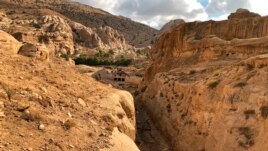30 April 2022
New projects in the Middle Eastern country of Jordan aim to repair damaged land in one of the world's most water-starved nations.
The restoration measures include bringing native plants back to areas where they disappeared, as well as building modern water collection systems.
Local organizations believe the projects will help lessen the effects of land mismanagement and climate change. The efforts seek to slow expanding desertification, which happens when land turns into desert.

This file photo shows where a dam was built in the 1960's by the Department of Antiquities, and the ancient Mudlim tunnel, both built to protect the area from flooding, in Petra, Jordan, Nov. 15, 2018. (AP Photo/Laure Van Ruymbeke, file)
A United Nations report released April 26 states that 40 percent of land worldwide is currently degraded. The report, by the U.N.'s Convention to Combat Desertification, predicts that by 2030, 700 million people could be displaced by drought. It blames the problems on land and water mismanagement, poor agriculture methods, mining and city development.
Jordan is one of several countries already struggling with the effects of degradation, the report said. But environmentalists in Jordan are already taking steps to prevent further land damage.
One of the efforts is introducing four native plants to 41 square kilometers of desert in the Sabha area, about 90 kilometers east of Jordan's capital, Amman.
"We're working on the water, we're working on the green cover and we're working also with the habitats of the creatures, from insects to animals..." said Deyala Tarawneh. She helped create WADI, an organization seeking to repair forests and grasslands and find ways to improve water security in Jordan.
"The success rate of these plants is 85 percent, which is considered a very high percentage," Tarawneh said. "And they only need to be watered once, which is also reducing the amount of water needed for the irrigation of the green areas."
But as WADI's efforts continue, environmentalists say land restoration in Jordan still faces major difficulties. One of them is a lack of land areas available for restoration. In addition, many people in local communities are not willing to leave the land alone for at least one or two rainy seasons to let it recover.
The U.N. report calls for financial support to strengthen restoration efforts in developing countries. Among other things, it urges the expansion of protected and conservation areas, better water management and improved agricultural methods.
If such measures are carried out, they can lead to reduced biodiversity loss and improved soil health, the report says. The efforts could especially help areas in North and Sub-Saharan Africa, the Middle East, and Latin America.
But the report also notes that a lack of action could result in up to 16 million square kilometers of land degradation by 2050. That is an area about the size of South America.
I'm Bryan Lynn.
The Associated Press and Reuters reported on this story. Bryan Lynn adapted the reports for VOA Learning English.
We want to hear from you. Write to us in the Comments section, and visit 51VOA.COM.
________________________________________________________________
Words in This Story
restore – v. to make something good exist again
mismanage – v. to organize or control something badly
degrade – v. damage the quality of something over time
drought – n. a long period of time during which there is very little or no rain
introduce – v. put something into use, operation, or a place for the first time
irrigate – v. provide water for an area of land so crops can be grown
conservation – n. the act of keeping something safe from harm or from being damaged or destroyed
biodiversity – n. the number and kinds of plants and animals that exist in a particular area or in the world generally